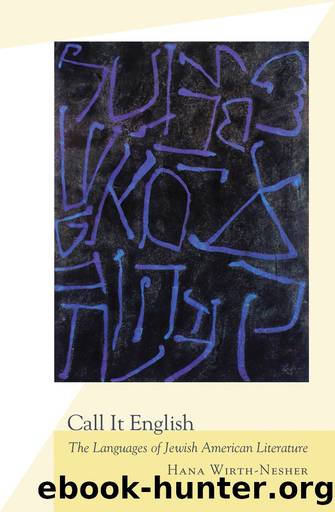Call It English by Wirth-Nesher Hana;

Author:Wirth-Nesher, Hana;
Language: eng
Format: epub
Publisher: Princeton University Press
Published: 2022-06-14T00:00:00+00:00
Moses Herzog: âHere i am. Hineni!â
Maybe he is Moses Herzog, translator and embodiment of cross-cultural translation. In 1964 Bellow published Herzog (for which he received the National Book Award), a novel about a Jewish intellectual, son of immigrant parents, who spends several weeks ruminating about his life and composing letters to both the dead and the living as he comes to terms with his failing career and marriage. In the wake of his wife Madeleineâs sexual infidelity with their neighbor and friend Valentine Gersbach, and of his inability to complete his study âoverturning the last of the Romantic errors about the uniqueness of the Self,â32 Herzog reviews his life as son, husband, father, lover, and thinker. Writing his letters to Nietzsche, Adlai Stevenson, General Eisenhower, contemporary scholars, ex-wives and lovers, and friends (among others), he evaluates his attitudes and behavior. (âWhen writing, I ask myself what is honorable or dishonorable,â says Bellow.)33 Recognizing that his big old house in the Berkshires is âthe symbol of his struggle for a solid footing in White Anglo-Saxon Protestant America,â Herzog acknowledges to himself, âI too have done my share of social climbingâ (309). Motivated by his guilt as absent father and by his jealousy of Gersbach who has usurped his paternal role, Herzog impulsively flies to Chicago to retrieve his daughter and to take revenge on the lovers, but a near disastrous car accident and the tender presence of his child rein in his planned outburst. Shaken by his ordeal and the recognition of his fragile humanity, Herzog returns to his pastoral house in Ludeyville for a temporary retreat, having expressed love for his brother, his son and daughter (with whom he intends to spend the rest of the summer), and the new woman in his life, Ramona. His brother and sister believe that he has suffered a breakdown just as he begins to feel that he is recovering. Having decided to sell his rural WASP haven, Herzog projects his doubts onto the mind of his brother Will, âHe expressed it to himself in Yiddish. In drerd aufn deck. The edge of nowhereâ (329). Ludeyville is not home; his social climbing days among those who complained about âthe Micks and the Spicks and the Sheeniesâ are over. âWhat a struggle I waged! . . . But enough of thatâhere I am. Hineni!â (310).
Concluding his inner journey for the identity of the man Moses Herzog with the Hebrew word uttered by his biblical namesake in reply to Godâs call from the Burning Bush, Bellow dramatically reverses the translation pattern of the novel where Hebrew and Yiddish words have always preceded their English translation. Herzogâs assertion that he is âhere,â by which he does not mean the sociogeographical place that is Ludeyville, appears in Hebrew to underscore the biblical narrative that has served as backdrop and linguistic and cultural framework out of which Moses Herzog comes to define himself. Just as Leopold Bloom is cast as a modern-day Ulysses, so Herzog is cast as a modernday Moses, with the difference that he is fully conscious of his biblical precursor.
Download
This site does not store any files on its server. We only index and link to content provided by other sites. Please contact the content providers to delete copyright contents if any and email us, we'll remove relevant links or contents immediately.
The Power of Myth by Joseph Campbell & Bill Moyers(681)
Four Shakespearean Period Pieces by Margreta de Grazia(666)
A Social History of the Media by Peter Burke & Peter Burke(640)
Inseparable by Emma Donoghue(610)
The Complete Correspondence 1928-1940 by Theodor W. Adorno & Walter Benjamin(510)
Bodies from the Library 3 by Tony Medawar(487)
The Spike by Mark Humphries;(470)
Culture by Terry Eagleton(465)
A Theory of Narrative Drawing by Simon Grennan(461)
World Philology by(452)
Ideology by Eagleton Terry;(445)
Farnsworth's Classical English Rhetoric by Ward Farnsworth(444)
A Reader’s Companion to J. D. Salinger’s The Catcher in the Rye by Peter Beidler(432)
Adam Smith by Jonathan Conlin(425)
Comic Genius: Portraits of Funny People by(410)
Monkey King by Wu Cheng'en(403)
Game of Thrones and Philosophy by William Irwin(400)
High Albania by M. Edith Durham(399)
Early Departures by Justin A. Reynolds(383)
